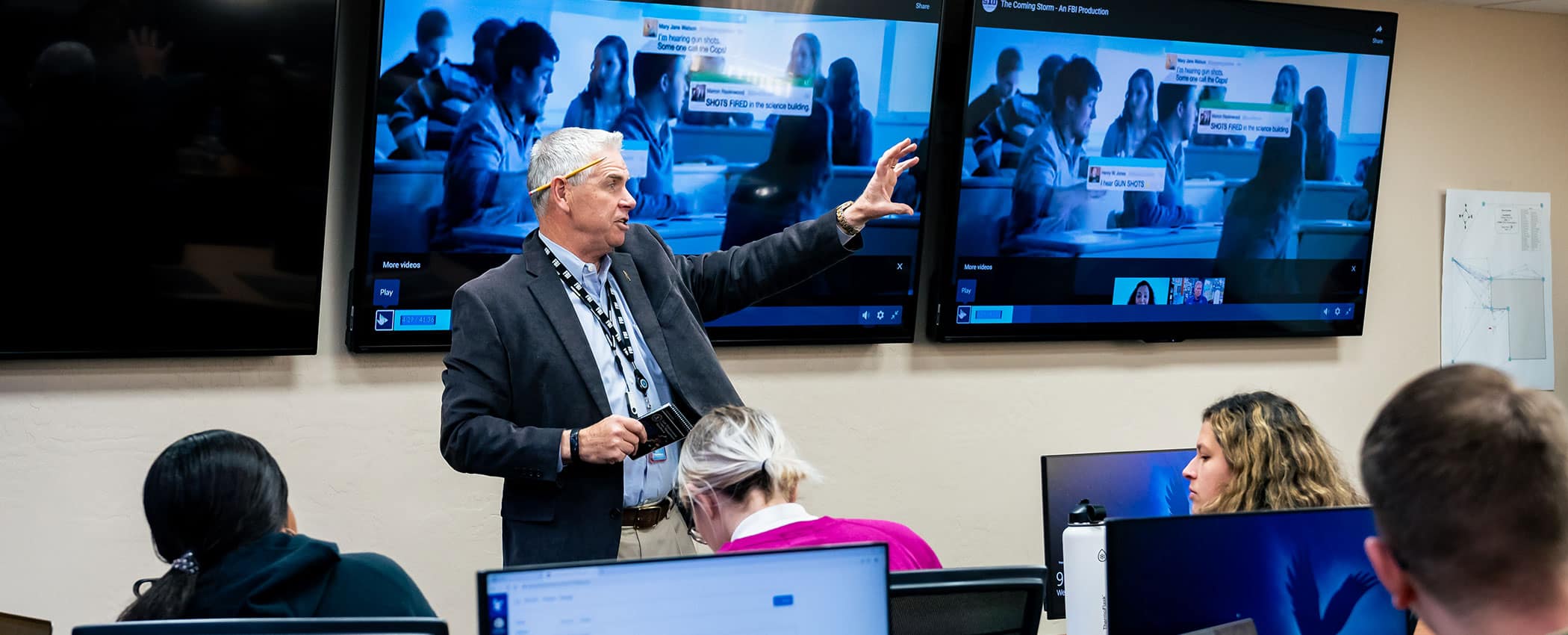
Master of Science in
Human Security and Resilience
The M.S. in Human Security and Resilience is tailored to recent graduates and working professionals who want to build skills in security studies, global conflict and sustainable solutions to foster resilience in communities worldwide.
About the Master of Science in Human Security and Resilience
This program empowers students to address complex global challenges, emphasizing the importance of protecting populations and fostering long-term, sustainable solutions to enhance communities' resilience. Human security is an interdisciplinary field that considers protecting individuals and their ability to recover and adapt to internal and external shocks, ranging from disasters to socio-political conflicts. First defined by the United Nations Development Programme in 1994, the concept of human security goes beyond the traditional understanding of security, emphasizing the well-being of individuals across different dimensions, including health, economic development and environmental sustainability. The field of human security closely aligns with the United Nations Sustainable Development Goals (SDGs), which emphasize building resilient communities and fostering sustainable development worldwide. Graduates of the Human Security and Resilience master's program are passionate about creating lasting solutions to prevent future crises and are committed to fostering a sustainable, secure world for future generations.
Embry-Riddle’s graduate degree in Human Security and Resilience is an online program designed for working professionals who want to transition into careers that address these global challenges. Students benefit from being part of a cutting-edge program whose curriculum is designed to align with current events and security practices, policies, legal frameworks and solutions.
Program Outcomes
You will have the opportunity to complete the following while pursuing human security and resilience studies:
- Study human security and resilience based on principles put forth by the United Nations, understanding their role in promoting sustainable development and addressing global challenges.
- Understand the driving factors behind global, regional and national trends that impact human development, diplomacy, sustainability and security.
- Increase awareness of the challenges of recovery after disasters, focusing on strategies that foster sustainable and resilient communities that can withstand future shocks.
- Examine the implications of working in a global environment, exploring how multinational collaboration fosters security, resilience and suitability across borders.
- Conduct innovative research focusing on stressors that can disrupt daily life from local to global scales while developing sustainable solutions that foster resilience in homes, workplaces and communities.
Through the interdisciplinary curriculum, students will:
- Evaluate human security by exploring its dimensions, such as health, environmental protection, human rights and economic stability, within the framework of the United Nations Sustainable Development Goals.
- Investigate the impact of digital communications on global security, exploring how local, national and global stakeholders manage and regulate new technologies to address emerging threats.
- Understand the causes of large-scale political violence and examine effective strategies fostering peace, stability and sustainable development in conflict-affected communities.
- Explore how global initiatives and frameworks, including the UN Sustainable Development Goals, foster sustainability on a global scale and help tackle human security challenges.
- Evaluate sources of resilience across countries at different stages of development, identifying effective strategies for building resilient communities in the face of crises like disasters, economic instability and conflict.
- Analyze how different stakeholders, including governments, regional and international organizations and the private sector, align their policies with international legal frameworks to address human security threats and promote sustainable solutions.
- Independently conduct innovative research in human security and resilience, focusing on sustainable strategies that build resilience in the future of communities worldwide.
Human Security and Resilience Career Opportunities
Careers and Employers
Embry-Riddle M.S. in Human Security and Resilience graduates often promote in the workforce with a placement rate of 100% within a year of graduation, with industry leaders such as:
- Department of Energy
- Department of Homeland Security
- FEMA
- United States Agency for International Development (USAID)
- United Nations
- U.S. Military
- U.S. Government Agencies
Online master's in human security graduates often secure roles such as:
- Climate Program Officers
- Emergency Management Directors
- Human Rights Analysts
- Operations Research Analysts
- Program Management Specialists
- Regional Planners
- Resilience Program Managers
- Social and Community Service Managers
Leadership Salary Information
Pursuing an M.S. in Human Security and Resilience from Embry-Riddle Aeronautical University can lead to competitive salaries averaging $99,000 annually as of 2022.
DETAILS
About Human Security and Resilience at the Worldwide & Online Campus
Awareness and understanding of the impact of the constant barrage of threats to life as we know it has become a growing area of academic study. Embry‑Riddle has created a graduate program in Human Security and Resilience to support individuals who seek the knowledge to meet these challenges head-on. The M.S. in Human Security and Resilience is a 30-credit online program offered through the Department of Emergency, Disaster and Global Security Studies in the College of Arts & Sciences. The degree is tailored for recent graduates and working professionals who want to advance their careers in this complex specialty.
The study of Human Security and Resilience is an exploration of the interplay between economic security, food security, health security, environmental security, personal security, community security and political security. At Embry‑Riddle, you’ll have the opportunity to learn these concepts from military officers, scholars, historians and professionals with experience in defense, environmental security, population health, international business, political science, humanitarian law and other relevant disciplines.
Human Security and Resilience Information
- Credits: 30
- Online or In-Person: Fully online, EagleVision Virtual Classroom or see if a Worldwide location is close to you
- Capstone: MHSR Capstone (3 credits)
Helpful Links
- Attend a Worldwide Virtual Info Session
- Discover the College's Faculty
- Explore the Fields of Study: Security, Intelligence & Safety
- Find Related Clubs & Organizations
Student Learning Outcomes
Students will:
- Evaluate dimensions of human security—including health, environmental protection, human rights, and economic stability—within global frameworks such as the United Nations Sustainable Development Goals (SDGs) while contrasting human security models with traditional state-centered security approaches.
- Investigate the impact of digital communications and cybersecurity on human security, analyzing how governments, international organizations, and private entities regulate emerging technologies to address transnational threats.
- Analyze the causes of political violence and organized communal conflict, identifying mitigation strategies and effective global approaches for fostering peace, stability, and sustainable development.
- Examine how global trends—such as climate change, migration, economic instability, and geopolitical shifts—contribute to political and economic destabilization and shape global security landscapes.
- Evaluate sources of resilience across countries with varying levels of development and effective strategies for building resilient communities in response to crises such as disasters, economic instability, and conflict.
- Analyze human security policy objectives in the context of international law, global governance structures, and transnational cooperation.
- Conduct comparative research on human security and resilience, integrating global perspectives and innovative methodologies to develop sustainable security strategies.
DEGREE REQUIREMENTS
Core/Major
| Common Graduate Core | 6 | |
| MHSR 500 | Introduction to Human Security | 3 |
| RSCH 670 | Research Methods | 3 |
| Human Security and Resiliency Specialization | 15 | |
| MHSR 515 | International Law and U.S. Security Policy | 3 |
| MHSR 520 | Principles of International Conflict Resolution | 3 |
| MHSR 530 | Environmental Security | 3 |
| MHSR 540 | Foundations of Resilience | 3 |
| MHSR 550 | Resilience Planning and Administration | 3 |
| Capstone | 3 | |
| MHSR 690 | MHSR Capstone | 3 |
| Total Credits | 24 | |
Electives
| Electives | ||
| Choose 6 credits from other graduate level courses approved by program chair. | ||
| Total Credits | 6 | |
| Total Degree Requirements | 30 | |
Plan of Study (MSHSR)
Recommended plan of study and sequence of courses for a two-year degree completion scenario. A two-year degree plan or a particular starting term are not required but serve as an example. Students should still make an effort to follow the sequence of courses as far as possible within their individual degree completion timeframe. Students should bear in mind that program courses are typically only offered one time per academic year and should take MHSR 500 as their first course or as soon as possible. While electives can be taken at any time, students are encouraged to take their core courses first.
Recommended Plan of Study for a Fall Start and Two-Year Degree Completion Scenario
Year 1
| Term 1 | Credits | |
|---|---|---|
| MHSR 500 | Introduction to Human Security | 3 |
| Credits Subtotal | 3.0 | |
| Term 2 | ||
| MHSR 520 | Principles of International Conflict Resolution | 3 |
| Credits Subtotal | 3.0 | |
| Term 3 | ||
| MHSR 515 | International Law and U.S. Security Policy | 3 |
| Credits Subtotal | 3.0 | |
| Term 4 | ||
| MHSR 540 | Foundations of Resilience | 3 |
| Credits Subtotal | 3.0 | |
| Credits Total: | 12.0 | |
Year 2
| Term 1 | Credits | |
|---|---|---|
| MHSR 550 | Resilience Planning and Administration | 3 |
| Credits Subtotal | 3.0 | |
| Term 2 | ||
| RSCH 670 | Research Methods | 3 |
| 1st Elective | 3 | |
| Credits Subtotal | 6.0 | |
| Term 3 | ||
| MHSR 530 | Environmental Security | 3 |
| 2nd Elective | 3 | |
| Credits Subtotal | 6.0 | |
| Term 4 | ||
| MHSR 690 | MHSR Capstone | 3 |
| Credits Subtotal | 3.0 | |
| Credits Total: | 18.0 | |
| Total Degree Requirements | 30 | |
Get Started Now:
Summary
30 Credits
Estimate your tuition by using the Tuition Calculator
View Financial Aid Information
Learn more about the benefits of an Online Degree
Learn about our General Education
Find out about transferring credits to this degree
Learn more about our Veterans & Military benefits
View our Academic Calendar
Search Courses for this degree



